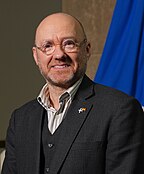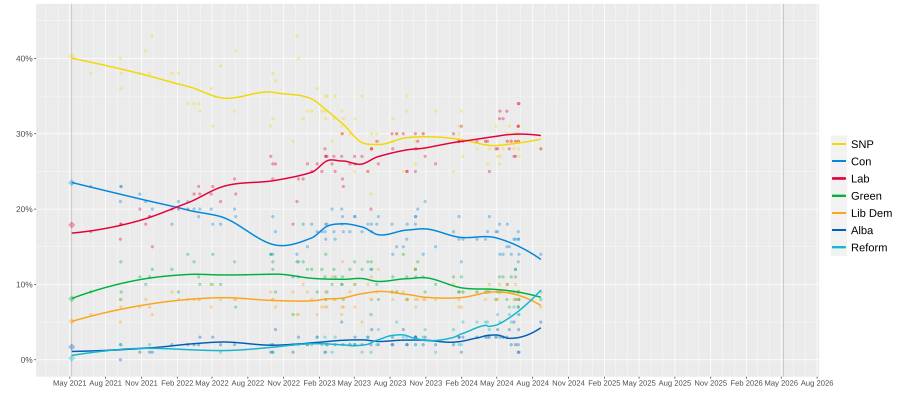Next Scottish Parliament election
| |||||||||||||||||||||||||||||||||||||||||||||||||||||||||||||||||||||||
All 129 seats to the Scottish Parliament 65 seats needed for a majority | |||||||||||||||||||||||||||||||||||||||||||||||||||||||||||||||||||||||
|---|---|---|---|---|---|---|---|---|---|---|---|---|---|---|---|---|---|---|---|---|---|---|---|---|---|---|---|---|---|---|---|---|---|---|---|---|---|---|---|---|---|---|---|---|---|---|---|---|---|---|---|---|---|---|---|---|---|---|---|---|---|---|---|---|---|---|---|---|---|---|---|
| Opinion polls | |||||||||||||||||||||||||||||||||||||||||||||||||||||||||||||||||||||||
| |||||||||||||||||||||||||||||||||||||||||||||||||||||||||||||||||||||||
| |||||||||||||||||||||||||||||||||||||||||||||||||||||||||||||||||||||||
The next Scottish Parliament election is required to be held no later than Thursday 7 May 2026, to elect 129 members to the Scottish Parliament. It will be the seventh general election since the parliament was re-established in 1999.
Six parties have MSPs in the sixth parliament: Scottish National Party (SNP) led by First Minister John Swinney, the Scottish Conservatives led by Russell Findlay, Scottish Labour led by Anas Sarwar, the Scottish Greens, led by their co-leaders Patrick Harvie and Lorna Slater, and the Scottish Liberal Democrats, led by Alex Cole-Hamilton. Of these parties, two have changed their leaders since the last Scottish Parliament election in 2021. Alba also have one MSP following a defection from the SNP, and John Mason sits as an independent after being expelled from the SNP.
Date
[edit]Under the Scottish Elections (Reform) Act 2020, an ordinary general election to the Scottish Parliament would normally be held on the first Thursday in May five years after the 2021 election, i.e. on 7 May 2026.[1] This Act superseded the Scotland Act 1998, which had set elections in every fourth year.[2]
The date of the poll may be varied by up to one month either way by the monarch, on the proposal of the Presiding Officer, making 4 June 2026 the latest possible date for this election, assuming the convention of holding elections on a Thursday stands.[2]
If Parliament itself resolves that it should be dissolved, with at least two-thirds of the Members (i.e. 86 Members) voting in favour, the Presiding Officer proposes a date for an extraordinary general election and the Parliament is dissolved by the monarch by royal proclamation.
It does not necessarily require a two-thirds majority to precipitate an extraordinary general election, because under the Scotland Act Parliament is also dissolved if it fails to nominate one of its members to be First Minister within certain time limits, irrespective of whether at the beginning or in the middle of a parliamentary term. Therefore, if the First Minister resigned, Parliament would then have 28 days to elect a successor (s46(2)b and s46(3)a). If no new First Minister was elected then the Presiding Officer would ask for Parliament to be dissolved under s3(1)a. This process could also be triggered if the First Minister lost a vote of confidence by a simple majority (i.e. more than 50%), as they must then resign (Scotland Act 1998 s45(2)).
No extraordinary general elections have been held to date. Any extraordinary general elections would be in addition to ordinary general elections, unless held less than six months before the due date of an ordinary general election, in which case they supplant it. The subsequent ordinary general election reverts to the first Thursday in May, five years after the previous ordinary election.[1][3]
Election system, seats, and regions
[edit]The total number of Members of the Scottish Parliament (MSPs) elected to the Parliament is 129.
The First Periodical Review of the Scottish Parliament's constituencies and regions by the Boundary Commission for Scotland, was announced on 3 July 2007. The Commission published its provisional proposals for the regional boundaries in 2009.
The Scottish Parliament uses an additional member system (AMS), designed to produce approximate proportional representation for each region. There are 8 regions, each sub-divided into smaller constituencies. There are a total of 73 constituencies. Each constituency elects one MSP by the plurality (first past the post) system of election. Each region elects 7 additional MSPs using an additional member system. A modified D'Hondt method, using the constituency results, is used to elect these additional MSPs.[4][5]
The Scottish Parliament constituencies have not been coterminous with Scottish Westminster constituencies since the 2005 general election, when the 72 former UK Parliament constituencies were replaced with a new set of 59, generally larger, constituencies (see Scottish Parliament (Constituencies) Act 2004). The boundaries used for the Scottish Parliament elections were then revised for the 2011 election. The Boundary Commission also recommended changes to the electoral regions used to elect "list" members of the Scottish Parliament,[6] which were also implemented in 2011.
The Second Periodic Review of constituency and regional boundaries began in September 2022 and is due to be completed by May 2025, with the view of being used in the next election in 2026.[7][8]
Target constituency seats
[edit]Below are listed all the constituencies which require a swing of less than 5% from the 2021 results to change hands. The Scottish Greens do not have any constituencies where they require a swing of less than 5% (having gained their current seats from the regional list vote). The 7.55% swing the Scottish Greens need to gain Glasgow Kelvin is their nearest opportunity in terms of a constituency seat, in which the party finished second in the last Scottish Parliament election behind the SNP.
SNP targets
[edit]| Rank | Constituency | Winning party 2021 | Swing to gain | SNP place 2021 | Result | |
|---|---|---|---|---|---|---|
| 1 | Dumbarton | Labour | 1.93 | 2nd | ||
| 2 | Eastwood | Conservative | 2.60 | 2nd | ||
| 3 | Shetland | Liberal Democrats | 3.38 | 2nd | ||
| 4 | Galloway and West Dumfries | Conservative | 3.55 | 2nd | ||
| 5 | Edinburgh Southern | Labour | 4.43 | 2nd | ||
| 6 | Aberdeenshire West | Conservative | 4.81 | 2nd | ||
| 7 | Dumfriesshire | Conservative | 4.98 | 2nd | ||
Conservative targets
[edit]| Rank | Constituency | Winning party 2021 | Swing to gain | Con place 2021 | Result | |
|---|---|---|---|---|---|---|
| 1 | Ayr | SNP | 0.20 | 2nd | ||
| 2 | Banffshire and Buchan Coast | SNP | 1.18 | 2nd | ||
| 3 | Aberdeen South and North Kincardine | SNP | 2.15 | 2nd | ||
| 4 | Perthshire South and Kinross-shire | SNP | 2.22 | 2nd | ||
| 5 | Aberdeenshire East | SNP | 2.31 | 2nd | ||
| 6 | Moray | SNP | 3.87 | 2nd | ||
| 7 | Angus North and Mearns | SNP | 4.98 | 2nd | ||
Labour targets
[edit]| Rank | Constituency | Winning party 2021 | Swing to gain | Labour place 2021 | Result | |
|---|---|---|---|---|---|---|
| 1 | East Lothian | SNP | 1.29 | 2nd | ||
Liberal Democrat targets
[edit]| Rank | Constituency | Winning party 2021 | Swing to gain | Lib Dem place 2021 | Result | |
|---|---|---|---|---|---|---|
| 1 | Caithness, Sutherland and Ross | SNP | 3.52 | 2nd | ||
MSPs not standing for re-election
[edit]Opinion polling
[edit]- Key
SNP – Scottish National Party
Conservative – Scottish Conservatives
Labour – Scottish Labour
Lib Dem – Scottish Liberal Democrats
Green – Scottish Greens
Alba – Alba Party
Reform – Reform UK
See also
[edit]- 2024 United Kingdom general election in Scotland
- Next Senedd election
- Next Northern Ireland Assembly election
Notes
[edit]References
[edit]- ^ a b "Scottish Elections (Reform) Act 2020". www.legislation.gov.uk. Archived from the original on 9 May 2021. Retrieved 9 May 2021.
- ^ a b "Scotland Act 1998 – Section 2 Ordinary General Elections". Office of Public Sector Information. Archived from the original on 19 May 2007. Retrieved 8 May 2007.
- ^ "Scotland Act 1998 – Section 3 Extraordinary General Elections". Office of Public Sector Information. Archived from the original on 19 May 2007. Retrieved 8 May 2007.
- ^ "Electoral system: How it works, 02 April 2003". BBC News. BBC. 2 April 2003. Archived from the original on 4 September 2007. Retrieved 6 May 2011.
- ^ "D'Hondt system". BBC News. BBC. 28 September 2009. Archived from the original on 13 November 2011. Retrieved 4 May 2011.
- ^ "Revised Recommendations" (PDF). Boundary Commission for Scotland. Archived (PDF) from the original on 12 June 2011. Retrieved 26 April 2011.
- ^ Scotland, Ballot Box (21 May 2023). "Scottish Parliament Boundary Review 2: Initial Proposals". Ballot Box Scotland. Retrieved 6 July 2024.
- ^ "Second Review of Scottish Parliament Boundaries | Scottish Boundary Commission". boundaries.scot. Retrieved 6 July 2024.
- ^ Paterson, Kirsteen (25 April 2023). "SNP MSP John Mason 'to stand down' at next election". Holyrood. Retrieved 1 May 2024.
- ^ Staff reporter (10 August 2023). "James Dornan: This is my last term as an MSP'". Holyrood. Retrieved 16 March 2024.
- ^ Brawn, Steph (29 September 2024). "Christine Grahame: I've never wanted to be a minister, I like freedom". The National.
- ^ "SNP MSP Ruth Maguire to stand down in 2026 after cancer diagnosis". BBC News. 16 November 2024.
- ^ Bark, Stephen (25 November 2024). "Ayrshire MSP to stand down at 2026 Holyrood election in 'difficult decision'". Daily Record.
- ^ Cochrane, Angus (17 December 2024). "Ex-First Minister Humza Yousaf to step down as MSP at next election". BBC News.
- ^ "MSP Oliver Mundell to stand down at the next election". BBC News. 9 January 2025.
- ^ Elliards, Xander (26 January 2025). "SNP minister confirms plans to resign from Holyrood after 27 years". The National.
- ^ Clark, Alasdair (28 January 2025). "EXCLUSIVE: Veteran Dundee SNP MSP Joe FitzPatrick to stand down". The Courier.
- ^ Paterson, Kirsteen (29 January 2025). "SNP MSP Michelle Thomson to stand down". Holyrood Magazine.
- ^ Pollock, Laura (9 February 2025). "Audrey Nicoll to step down at Holyrood 2026". The National.
- ^ Pollock, Laura (13 February 2025). "SNP MSP Evelyn Tweed to stand down ahead of Holyrood election". The National.
- ^ McDougal, Mark (19 February 2025). "SNP's Graeme Dey to step down as MSP in 2026 election". The Herald.
- ^ Taylor, Ryan (20 February 2025). "UPDATED: Tribute paid to Wishart after decision to stand down". The Shetland Times.
- ^ Nutt, Kathleen (25 February 2025). "Scottish Conservative Liz Smith to stand down at election". The Herald.








